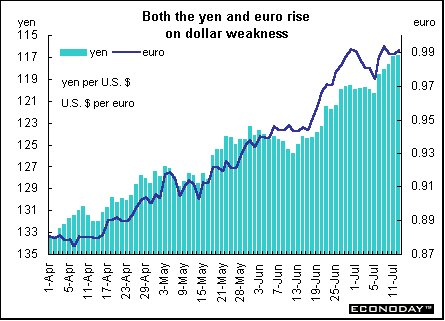
Currencies
While analysts generally say the U.S. economy is in a steady, if not strong, economic recovery, any sign that the rebound may be flagging sends ripples through the markets and further undermines the dollar. The euro has pushed near parity with the U.S. currency. Rather than rush home and into the safety of cash, investors appear to be diversifying by buying bonds and stocks in the emerging markets. This is putting downward pressure on the dollar. But investors have found no comfort in Europe. Most markets there are down more than 20 percent for the year. Though the euro has gained as some investors reduce their exposure to the United States, Europe's poorer growth prospects are an unattractive alternative for equity investment.
Euro gains against the dollar could be limited by concern that the EMU economy is losing pace. Economic growth in the eurozone will be slower than expected this year, according to the International Monetary Fund. French and German industrial production fell in May, investor sentiment declined, and German unemployment climbed last month to the highest level in almost three years.

Over the past three months, the dollar has moved in the same direction as U.S. stocks nearly every day, compared with about half the time during the prior three-month period. Investors have driven stocks lower as prominent companies have said they're under federal investigations, adding to concern companies are misrepresenting their earnings. The negative sentiment is magnifying movements in stocks, which are spilling over to cause weakness in the dollar.
On seven days since May 22, the Japanese government has sold yen to stem the currency's climb against the dollar. The yen continues to appreciate and is about 6 percent stronger than when the Ministry of Finance started directing the central bank to sell the currency. Japan's Finance Minister Masajuro Shiokawa said this week the government would never allow the yen to go back to 115 or 116, indicating his ministry will sell the currency before that. Traders are going to test the resolve of Shiokawa and the finance ministry to see if they are serious about keeping the yen from breaking through the 115 level. Financial authorities in Japan have repeatedly expressed concern that a rising yen would dent the overseas earnings of Japanese companies. Exports accounted for half the January-though-March growth rate, which was Japan's first economic expansion in a year.
 |


Last Week's Highlights • Global Stock Market Indexes • Recap of Global Markets • Currencies • Indicator Scoreboard

The Bottom Line • Looking Ahead
|
![[Back To Archive]](../../../images/backtoarchive.gif)